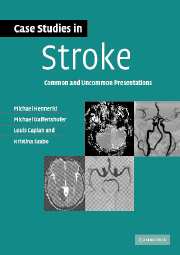Preface
Published online by Cambridge University Press: 23 November 2009
Summary
Despite increasing research interest in basic neurosciences, and through randomised clinical trials, case reports remain the daily experience of academic physicians. Stroke is an important and rapidly growing field in neurology and beyond, placing a large burden on patients, relatives and the economy in industrialized societies. Widely disregarded a quarter of a century ago, the diagnostics of brain tissue and vascular structures and classification of stroke subtypes, prognosis and outcome have improved considerably. This has led to better management through very early, specific treatment on stroke units, as well as primary and secondary prevention strategies in subjects at risk. Interdisciplinary work amongst neurologists, who generally lead the stroke team, cardiologists, neurosurgeons, interventional radiologists and physiotherapists, speech therapists, rehabilitation and preventive medicine physicians has created a widespread stroke network around the world. Supported by academic grants, a large scientific community is now involved in international research, and major stroke conferences attract thousands of attendees to exchange their ideas, from bench-to-bedside and vice versa.
Despite these worldwide, interdisciplinary activities, physicians, and neurologists in particular, still enjoy the challenge of evaluating patients who present with diagnostic and therapeutic difficulties. This is reflected by the continued popularity of Case Histories and Case Reports during the European Stroke Conference as well as their presentation in major leading world journals.
- Type
- Chapter
- Information
- Case Studies in StrokeCommon and Uncommon Presentations, pp. xv - xviiiPublisher: Cambridge University PressPrint publication year: 2006

